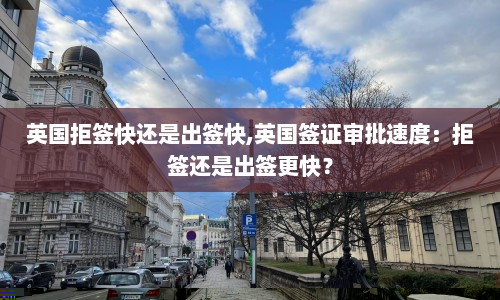Introduction

Applying for a visa can be a long and daunting process, with many factors influencing whether or not it will be approved, and how long it will take to be approved. In the case of the United Kingdom, applicants are often left wondering: is it faster to receive a rejection or an approval?
Factors Influencing Visa Approval Speed
The speed of visa approval depends on a number of factors, including the type of visa being applied for, the accuracy and completeness of the application, and the applicant's personal circumstances, such as their country of origin and travel history. Additionally, changes in immigration policies and staffing levels at embassies and consulates can also impact visa processing times.
UK's Visa Approval and Rejection Speeds
Despite the many factors that can influence visa approval speed, there is evidence to suggest that the UK's rejection speed is quicker than its approval speed. According to a 2020 report by AY Migration, a UK immigration and visa advisory firm, rejection rates for UK tourist visas increased to nearly 20% in 2020, up from under 4% in 2017. The same report also found that the average processing time for UK tourist visas had increased from 15 to 30 days.
Factors Contributing to UK's Rejection Speed
There are several factors that contribute to the UK's rejection speed, including stricter immigration policies, increased scrutiny of applications, and a lack of clear guidance on what is required to obtain a UK visa. The UK government has implemented a number of measures in recent years to tighten its immigration policies and reduce the number of fraudulent applications, which has resulted in more rejections and longer processing times.
Factors Contributing to UK's Approval Speed
While the UK's approval speed may be slower than its rejection speed, there are still factors that contribute to how quickly a visa will be approved. One of the most important factors is the accuracy and completeness of the application. Applicants who provide all of the required documentation, answer all questions truthfully and accurately, and have a clear and convincing reason for travelling to the UK are more likely to have their visa approved in a shorter amount of time.
Conclusion
Ultimately, whether it is faster to receive a rejection or an approval for a UK visa depends on a variety of factors, including the type of visa being applied for, the accuracy and completeness of the application, and the applicant's personal circumstances. While rejection rates and processing times for UK visas have been on the rise in recent years, applicants who carefully prepare their applications and provide all the necessary documentation have a greater chance of having their visas approved.
